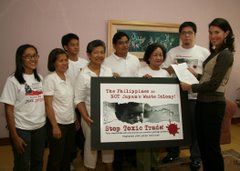THE PHILIPPINE SENATE
SHOULD REJECT THE
JAPAN-PHILIPPINES ECONOMIC PARTNERSHIP AGREEMENT (JPEPA)
1. The secrecy, lack of public disclosure and exclusion of stakeholders,including members of Congress, in the processes leading to the adoption of JPEPA violate the Philippine Constitution on people’s participation in matters of public interest. Akbayan representatives and concerned groups had to file a Supreme Court case in order to get a copy of the full text and annexes of the JPEPA.
2. Toxic and hazardous wastes are scheduled for tariff elimination despite clear national laws and international commitments. A side note was subsequently issued to supposedly “fix” the problem but the same note covers only toxic wastes. Clinical and municipal wastes remain.Said note is also of dubious legal validty.
3. Contrary to repeated media statements, the actual text of the JPEPA reveals that the
4. Article 4 of the JPEPA ties the hands of the Senate and the House of Representatives and requires them to “examine the possibility of amending or repealing laws and regulations that pertain to or affect the implementation and operation of this Agreement, if the circumstances or objectives giving rise to their adoption no longer exist or if such circumstances or objectives can be addressed in a less trade-restrictive manner.” This provision does not exist in
6. In terms of market access, JPEPA is clearly lopsided in favor of Japanese agricultural and industrial products. The
7. Article 27 of the JPEPA mentions cooperation in relation to used four-wheeled motor vehicles; a clear violation of EO 156 that prohibits the same. It is a clear disregard of a ruling by the Supreme Court that upheld the validity of the said law. The negotiators have repeatedly said in various fora that national laws will be respected but Annex 1: Notes of the JPEPA clearly show that “On the request of either Party, the Parties shall negotiate on issue such as market access conditions on used motor vehicles.” Furthermore, Article 27 does not exist in
8. Contrary to the Executive Department’s claim that JPEPA will spur economic growth and alleviate poverty, with the lopsided provisions in favor of the Japanese and the absence of a clear national and development plan for the Philippines, JPEPA may very well hasten the demise of the Philippine manufacturing and agricultural sectors and tragically sink majority of the population into deeper poverty.
9. JPEPA will restrict local government autonomy, legislative and taxation powers.
10. The administration of the treaty will create bureaucratic and financial nightmares that will effectively wipeout whatever little economic benefits there may be under JPEPA.
11. The JPEPA is but the first in a long line of free trade and economic partnership agreements currently being negotiated by the
12. The Executive Department’s insistence that JPEPA be concurred with because the
This is about our livelihoods. Our lives.
We have faith in our Senators.
JUNK JPEPA.
-----
Friday, Sept. 14, 2007: Senators slam "fuzzy" gov't presentation of JPEPA.Read here.
Saturday, Sept. 15, 2007, Philippine Daily Inquirer, page A9: Senators not impressed on JPEPA.
news found here.
** The Coalition accepts volunteers (lawyers, economists, writers, students, etc). We cannot pay everyone but we can feed you.:) Please feel free to email us.






No comments:
Post a Comment